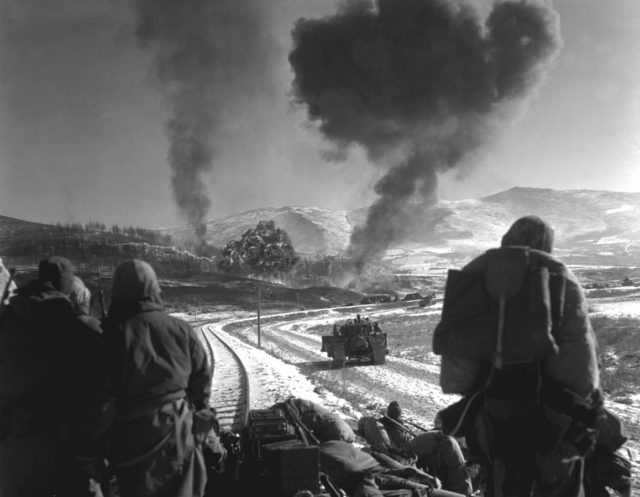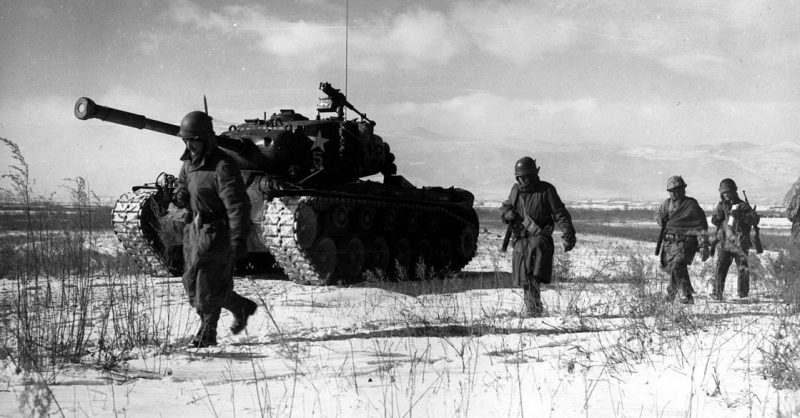The Korean War, the conflict that, for American soldiers, was sandwiched in between WWII and Vietnam, is often referred to as ‘The Forgotten War,’ but for many veterans such as Corporal John Baer of Naples, Florida it is still very much alive in their memories. John Baer spoke in an interview with the Naples Daily News of his experiences during the war and the three Purple Hearts that he was awarded.
The Korean War was fought between those in favor of communism (North Korea aided by the Chinese and the Soviets) and those against communism (South Korea aided by the United Nations with troops from the USA as the principal force). It commenced when North Korea invaded South Korea on 25th June 1950 and ended with an armistice being signed on the 27th July 1953, which divided Korea along the 38th Parallel. No official peace treaty has ever been signed.
The year was 1952, and John Baer, serving with the 1st Marine Division, was seeking shelter after being hit in the shoulder by a bullet. He couldn’t move his arm, so he sought cover in a bunker, on the aptly named Bunker Hill, as there was an incessant bombardment by the Communist Forces. As he was sheltering a shell exploded in the doorway and Baer was again wounded in the back and arm by shrapnel. What a way to spend your mother’s birthday he thought as he remembered the date was 11th September. His friend, Ernest “Rosey” Rosengrant was standing in the doorway when the shell exploded and sustained serious wounds. Baer knew he had to save his friend so supporting him with his shoulder, he half carried, and half dragged Rosey along the path through the paddy fields back towards the UN forces main line. Under normal circumstances, this trip took ten to fifteen minutes but with his own and Rosey’s wounds it took Baer over a half hour to get back to the main line.
Baer said, “I stopped and rested every once in a while, he kind of helped me along. He had one leg he could move, but dragged the other one because it was paralyzed.”
Baer kept thinking, “I have to do this. I have to do this. I’ll go. I’m going to do it,’ ” he said. “I just kept going.”
Eventually, Baer made it back with Rosey, who was then transferred by helicopter to the hospital. The next time Baer saw him, was when they were in hospital together in Japan. There he found out that Rosey had lost an eye, but Baer’s help had saved his life. Rosey remained paralyzed down the right side of his body, but he went on to learn to write with his left hand and qualified as an architect.
Baer was awarded his first Purple Heart while lying in hospital. “I didn’t think it was a big deal,” he said. “I just think of the guys that never made it, you know. They got the Purple Heart. They didn’t know it.”
A couple of months later, he had recovered and was once again defending the 38th parallel, where his unit had been assigned to protect three hills that they had named Reno, Vegas, and Carson. Each day the troops tried to remain awake and alert and as night drew in it was a mad scramble to get to the top of the hill before the Communist forces could lay claim to the high ground. This resulted in some of the bloodiest hand-to-hand combat of the war with both sides fighting with guns, bayonets, and sometimes even bare knuckles.
Baer still has a vivid recollection of these battles, “We could hear them coming,” he said. “Blowing bugles and screaming and hollering. I still hear those noises every once in a while.”
The infrequent quiet times also allowed time for Baer to think philosophical thoughts, “I used to think: That guy is trying to kill me. I’m trying to kill him. I don’t even know him. He has a mother, father, sister, brother — just like me. Why are we trying to kill each other? But when somebody is trying to kill you, you know, your whole thoughts change.”

On his birthday, this time, 22nd November, he was again wounded by shrapnel while conducting a raid near Vegas. His right arm had been ripped up and after stitches and a few days on a hospital ship, he was again back on the 38th parallel; the proud owner of a second Purple Heart.
Finally, just before Christmas, he was wounded for the third time when shrapnel and a bullet pierced his hip while on a raid near Reno. Enough was enough, and Baer decided that this was third time lucky and pushing his luck further was not in his immediate future, so in May 1953 he returned to Ohio, and his wife, Sylvia. This injury earned him his third, and last, Purple Heart,
Baer, like many vets, does not talk about his experiences very much, but he does not regret his year-long tour of duty, as the Naples Daily News reports.
“I know the people that were there never forgot it,” he said. “We were there for a reason. We did a good job. South Koreans are happy and very prosperous now. And they deserve it.”
Below is a newsreel from 1950, showing some footage from the conflict.
https://www.youtube.com/watch?v=OF_Ts_6oSi8
